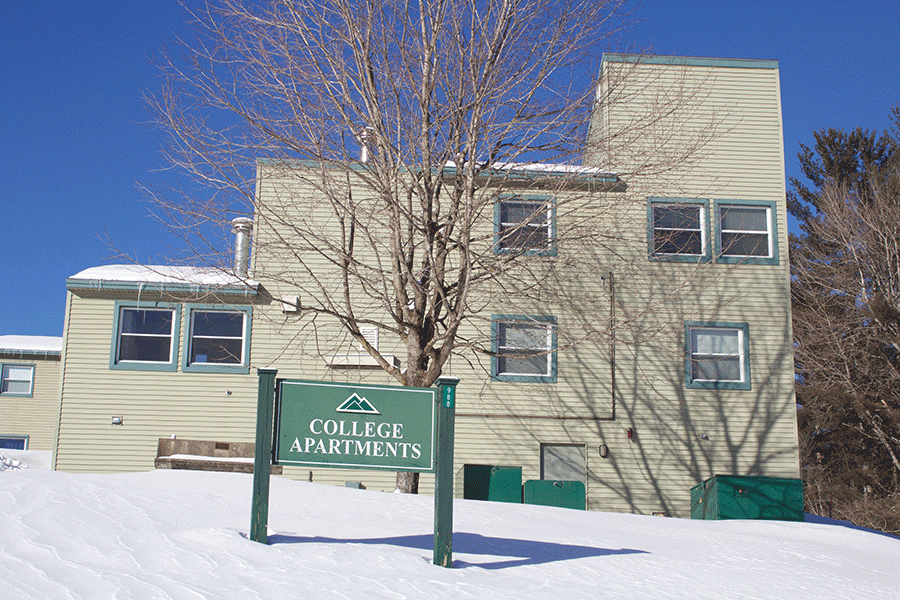College apartment applications move online
It’s that time of year again, and students who plan to return to the college in the fall are starting to think about their future housing plans. This year, students who are applying to live in a college apartment will go through the same process as students applying to live in the dorms instead of using a separate paper application.
“The change to an online application is mainly because I think that’s a much better way to manage housing contracts and applications. We also moved the summer housing application into the same form, so everything is together now,” said Director of Resident Life Jeff Bickford.
In January, Bickford sent out a campus-wide email explaining the new online application process for the apartments. Changes include a point system instead of letters of recommendations, and everyone will apply through the old housing contract with an option to live in the college apartments instead of the just the dorms.
“Paper applications are easier to lose, both for the student and for an office, and I wanted to shift to having everything together,” said Bickford.
With all on-campus resident applications in one place, the apartment application will become easier, and students will no longer need letters of recommendation to apply to live in a college apartment.
“For most of our students…our office was the last people they rented from. We have a pretty good idea of who is trustworthy. Let’s streamline the whole process wherever we can,” said Bickford.
Instead of letters of recommendation, the resident life office is implementing a point system that will be the deciding factor of who gets apartments and who doesn’t. One point can be gained in each of the following five categories: students have satisfied the requirement to live on campus, students are in a good standing with the Dean of Students Office, students have a good academic standing, students have lived in the apartments before and students have a dependent child living with them in the apartment.
According to Bickford, good academic standing will start with a 2.5 GPA as that has been the required GPA for the apartments in the past. A good standing with the Dean of Students Office means no disciplinary sanctions, but Bickford noted that they are open to making exceptions depending on how a student has done since the event.
“The main purpose of [the point system] in this application is to rig the game in favor of current apartment residents. We’re working toward the apartments being seen as part of an overall housing program, but giving priority to current residents to stay or move within the complex was a very high priority for me in figuring out how to assign apartments,” said Bickford.
In the case of a tie in the point system, Bickford stated that residents with the most credit hours earned would come out on top. This is consistent with how Resident Life deals with ties in the dorm application program.
Up until now, students who already live in a college apartment and wish to continue living in one haven’t had to re-apply, but they would have had to declare if they were staying at the college or not. With the new online application, residents who are already in the apartments must re-apply for next year, but it is Bickford’s plan to favor those students already settled into an apartment.
“I wasn’t fully aware of the process before, but I’m not sure I’m a fan of having to re-apply after living in them [the apartments] for two semesters,” said Kait Boucher, who will return to JSC in the fall as a senior.
In past years, returning apartment residents weren’t clear about their intentions to return and that would cause frustration with students looking to get into the apartments for the first time.
“Students who would apply for an apartment very early may never get an offer because people weren’t responding about their intentions to return. Over the years I heard a lot of frustration about the entire assignment system from people trying to get in there, so I decided if the apartments ever came back over to Residence Life,” said Bickford, “we would have an assignment process more consistent with our overall housing program.”
Another difference between the new process and the old is the timeline. Apartment applications are now due on the same date as housing contracts, which is March 31. In past years, the earlier students applied, the higher they would be on the waiting list. This year, there will be no priority for students who apply early.
“The point-based system seems a bit more fair than a first come, first serve basis,” said Spencer Perry, who has re-applied to live in his apartment next fall. “For example, in my instance, I’m waiting to find out from a friend about being roommates and if it were the old system I wouldn’t have the luxury to be able to wait.”
Bickford is confident that by combining the applications, the overall housing process will be simpler, and he is now looking to forward to simplifying the housing contract terms and conditions because the Student Handbook covers a lot of what’s in it.
“Housing operations is always a matter of balancing the preferences of students with the needs of the institution,” said Bickford. “I think that once we get through a couple cycles of this assignment process and people get used to the fairly large culture change of having the apartments be part of the overall housing system, most people will see that we’re on the right track of balancing both.”



